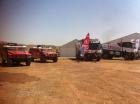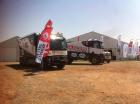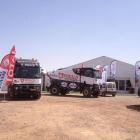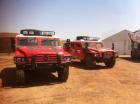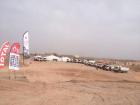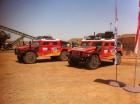Morocco Desert Challenge with zero liaisons this time
19.4.2017
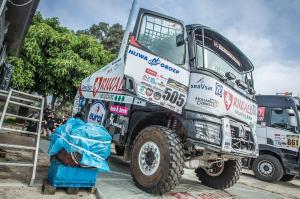 Seven new stages, seven new bivouacs. There is a great week-long adventure ahead of the participants of this year’s Morocco Desert Challenge. The trucks competing in Africa will include two from the MKR Technology’s development centre. In fact, a special from the Czech technology centre dominated the race, previously known as the Libya Rally, in 2016.
Seven new stages, seven new bivouacs. There is a great week-long adventure ahead of the participants of this year’s Morocco Desert Challenge. The trucks competing in Africa will include two from the MKR Technology’s development centre. In fact, a special from the Czech technology centre dominated the race, previously known as the Libya Rally, in 2016.
The starting field of the new version of the extreme African rally includes the Renault Trucks Sherpa carrying the winning Mammoet Rally Sport team from the Netherlands with Martin van den Brink at the steering, North Bohemia’s Daniel Kozlovský as the crew mechanic Daniel Kozlovský and Wouter de Graaff as the navigator. They are going to cooperate with the Riwald Dakar Team and their K520 trambus Renault manned by Gert Huzink, Rob Buursen and Benny Nauta. Both crews are supplied with technical support by the North Bohemia based constructors and mechanics team led by Mario Kress. “They all met in Agadir, which was the meeting point, on Good Friday. Before that we exhibited our specials in Marakesh in order to bring something special to the Renault Trucks customers at the event days there. Our presence at events like that underscores our long-standing cooperation,” commented Klára Kress, executive manager of MKR Technology.
This year’s rally is marked by significant changes in terms of size and level which have made it the likes of the Dakar and Silk Way. The innovations have reflected in the record-high number of crews racing this year who will tackle seven stages starting in Agadir. Route of the Morocco Desert Challenge will take them from coast to coast. Following technical handovers which took place this past weekend, the race started on Monday at the virgin Plage Blanche beach at the Atlantic Ocean and is about to finish one week later at the Mediterraenean. The race is going to pass the Algerian border through beautiful parts of Morocco far from tourist spots. The organizers have promised great adventurous surprises and fast tracks, but also technical sections, vast African planes, multitude of sand dunes, salt lakes, and legendary stages of the actual Dakar rally. The participants can look forward to desert bivouacs, too. “What makes this rally remotely different are zero liaisons. Each stage begins and ends at a bivouac, and so every kilometre counts. I believe this will make the whole race even more attractive, with the organizers expecting other rallies to copy this and thereby establishing new standard. No doubt this will be demanding and our technology will be thoroughly tested, but we like the idea,” commented Mario Kress, boss of the MKR Adventure project and chief constructor, whose team was hard at work developing technology after the Dakar rally. “We focused on issues that caused problems at the Dakar. We definitely improved cooling and boosted the engine performance in general. I am certain we are going to to deal with all challenges successfully this year, just like we did last year. After all, we came for a solid result,” winked Mario Kress with a smile.
In total the trucks will have to tackle two thousand one hundred fifty-seven racing kilometres starting on Easter Monday and finishing on Sunday in Oujda.









